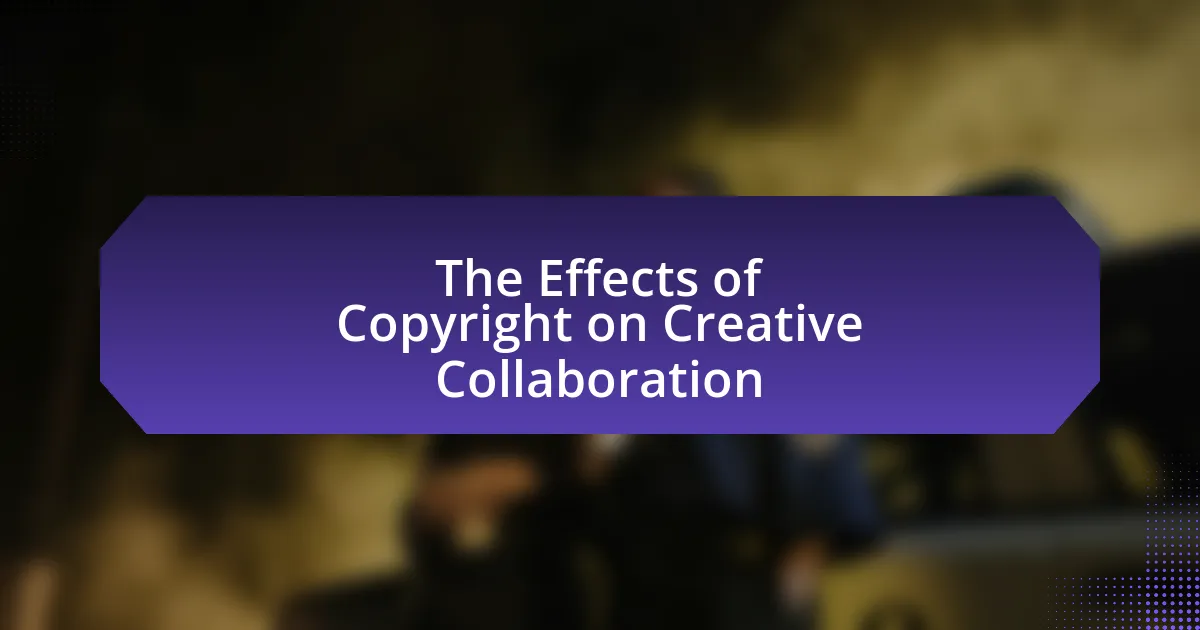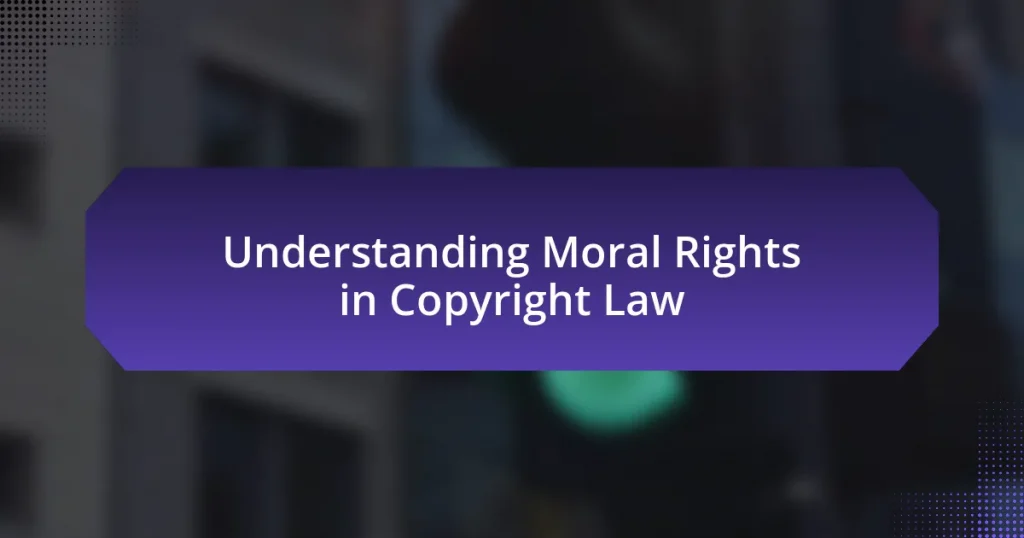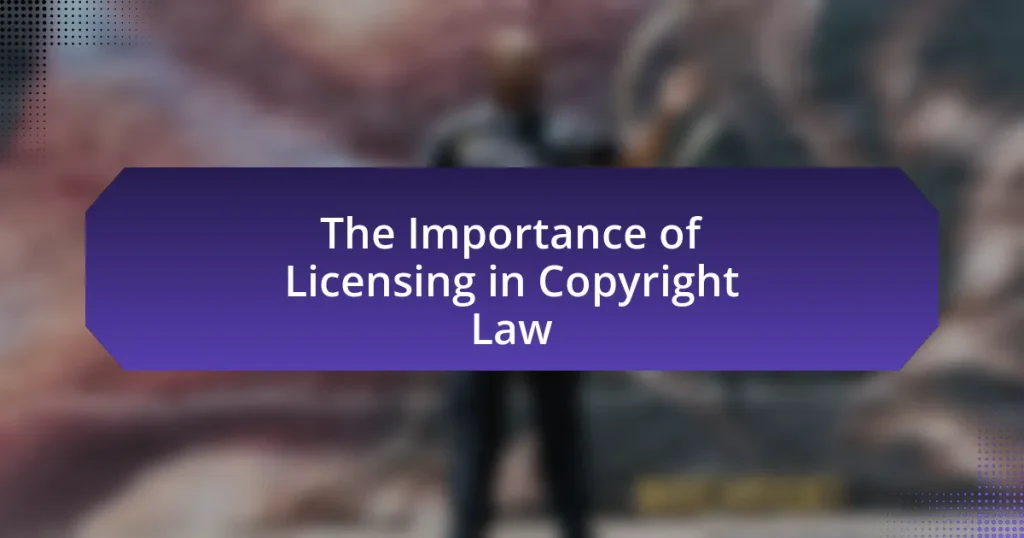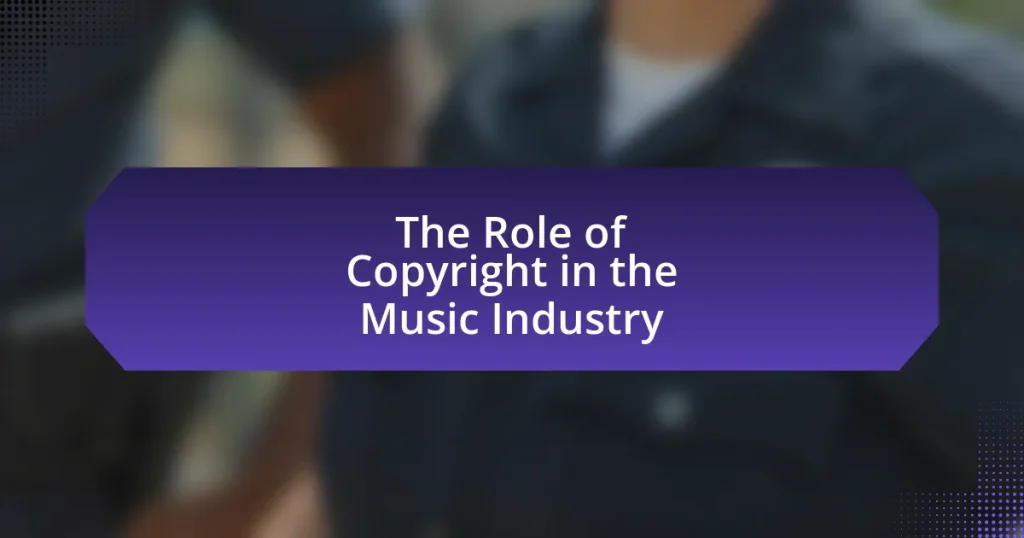The article examines the effects of copyright on creative collaboration, highlighting how copyright laws establish legal boundaries that protect original works while potentially hindering the free exchange of ideas. It discusses the influence of copyright on the dynamics of creative partnerships, the legal implications in collaborative projects, and the challenges creators face, including ownership disputes and licensing complexities. Additionally, the article explores how copyright can both promote and stifle innovation, the risks of infringement, and best practices for navigating copyright effectively in collaborative environments. It also outlines alternative approaches to traditional copyright and resources available for understanding copyright in collaborative settings.
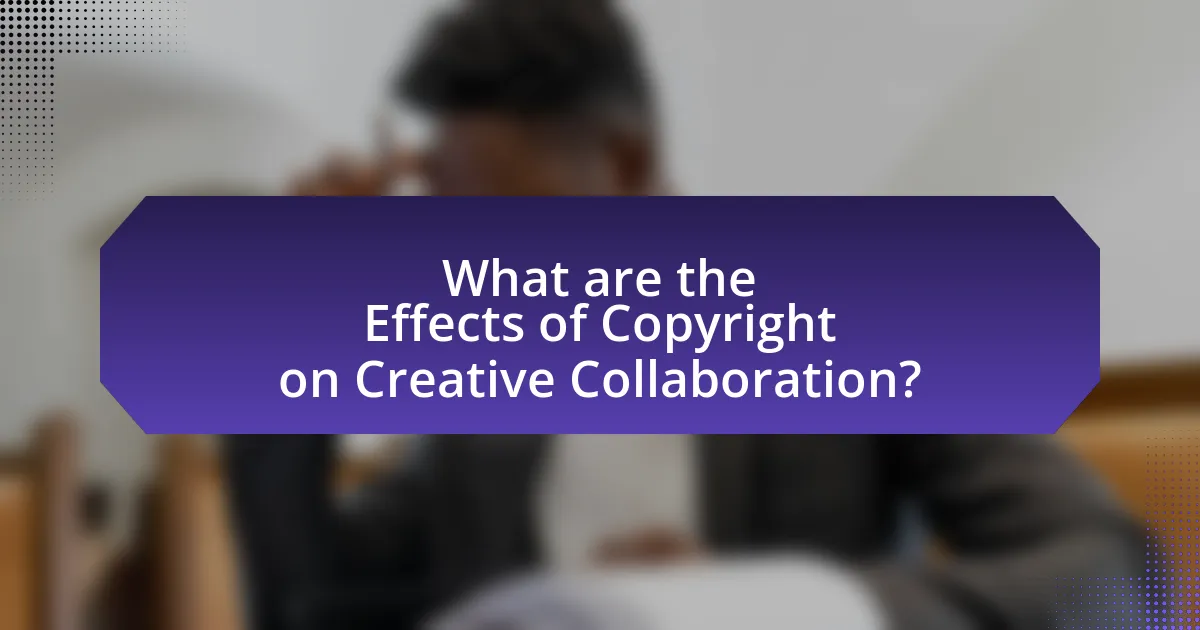
What are the Effects of Copyright on Creative Collaboration?
Copyright significantly impacts creative collaboration by establishing legal boundaries that protect original works while also potentially hindering the free exchange of ideas. When creators collaborate, copyright laws can create uncertainty regarding ownership and usage rights, which may discourage participation or lead to conflicts. For instance, a study by the World Intellectual Property Organization (WIPO) highlights that unclear copyright terms can result in reduced collaboration among artists, as they may fear losing control over their contributions. Additionally, copyright can incentivize creators to innovate within the confines of the law, but it can also stifle creativity if individuals feel restricted by the fear of infringement. Thus, while copyright aims to protect creators, it can simultaneously complicate and limit collaborative efforts in creative fields.
How does copyright influence the dynamics of creative partnerships?
Copyright significantly influences the dynamics of creative partnerships by establishing legal ownership and control over creative works. This legal framework dictates how collaborators can use, share, and profit from their joint creations, thereby shaping the terms of collaboration. For instance, copyright laws can incentivize partnerships by ensuring that all parties receive recognition and financial benefits from their contributions, as seen in the music industry where songwriters and producers negotiate copyright shares to protect their interests. Additionally, clear copyright agreements can prevent disputes and misunderstandings, fostering a more collaborative environment. According to a study published in the Journal of Intellectual Property Law & Practice, effective copyright management in creative partnerships leads to increased innovation and productivity, highlighting the essential role of copyright in facilitating successful collaborations.
What are the legal implications of copyright in collaborative projects?
The legal implications of copyright in collaborative projects primarily involve the ownership and rights to the created work. In collaborative settings, copyright ownership can be shared among contributors, which means that each participant may hold rights to the work unless otherwise agreed upon. This is supported by the Copyright Act of 1976, which states that works created by multiple authors are considered joint works, and each author has equal rights unless a different arrangement is established in a written agreement. Additionally, the lack of a clear agreement can lead to disputes over usage rights, profit sharing, and attribution, highlighting the necessity for explicit contracts to define each party’s contributions and rights.
How do copyright laws affect the sharing of ideas among collaborators?
Copyright laws significantly restrict the sharing of ideas among collaborators by establishing ownership rights over creative works. These laws protect the expression of ideas, meaning that collaborators must navigate legal boundaries to share and build upon each other’s contributions without infringing on copyright. For instance, if one collaborator creates a piece of content, they hold exclusive rights to that work, which can limit how others use or modify it. This legal framework can lead to hesitance in sharing ideas freely, as collaborators may fear potential legal repercussions or disputes over ownership. Consequently, while copyright laws aim to protect creators, they can inadvertently stifle open collaboration and the free exchange of ideas essential for innovation.
What challenges do creators face due to copyright in collaboration?
Creators face significant challenges due to copyright in collaboration, primarily related to ownership disputes and licensing complexities. When multiple creators contribute to a project, determining who holds the copyright can lead to conflicts, especially if agreements are not clearly defined beforehand. For instance, a study by the Copyright Office indicates that unclear ownership can result in legal battles, which can be costly and time-consuming. Additionally, creators may struggle with obtaining permissions for using each other’s work, as copyright laws require explicit consent for reproduction or adaptation, complicating the collaborative process. These challenges can hinder creativity and limit the potential for innovative projects, as creators may be reluctant to share their work without clear legal protections.
How can copyright disputes arise in collaborative environments?
Copyright disputes can arise in collaborative environments when multiple creators contribute to a work without clear agreements on ownership and rights. In such settings, differing expectations about the use and distribution of the work can lead to conflicts. For instance, if one collaborator believes they have exclusive rights to the final product while others assume shared ownership, misunderstandings can escalate into legal disputes. Additionally, the lack of formal contracts outlining each party’s contributions and rights can exacerbate these issues, as seen in cases like the legal battles over the song “Blurred Lines,” where contributors had differing views on copyright ownership.
What are the risks of infringement in creative collaborations?
The risks of infringement in creative collaborations include unauthorized use of intellectual property, potential legal disputes, and damage to professional relationships. Unauthorized use occurs when collaborators utilize each other’s work without permission, leading to copyright violations. Legal disputes can arise from disagreements over ownership rights, which may result in costly litigation. Additionally, infringement can harm trust and collaboration dynamics, as parties may feel exploited or undervalued. According to a study by the World Intellectual Property Organization, 30% of creative professionals reported experiencing disputes related to copyright issues, highlighting the prevalence of these risks in collaborative environments.
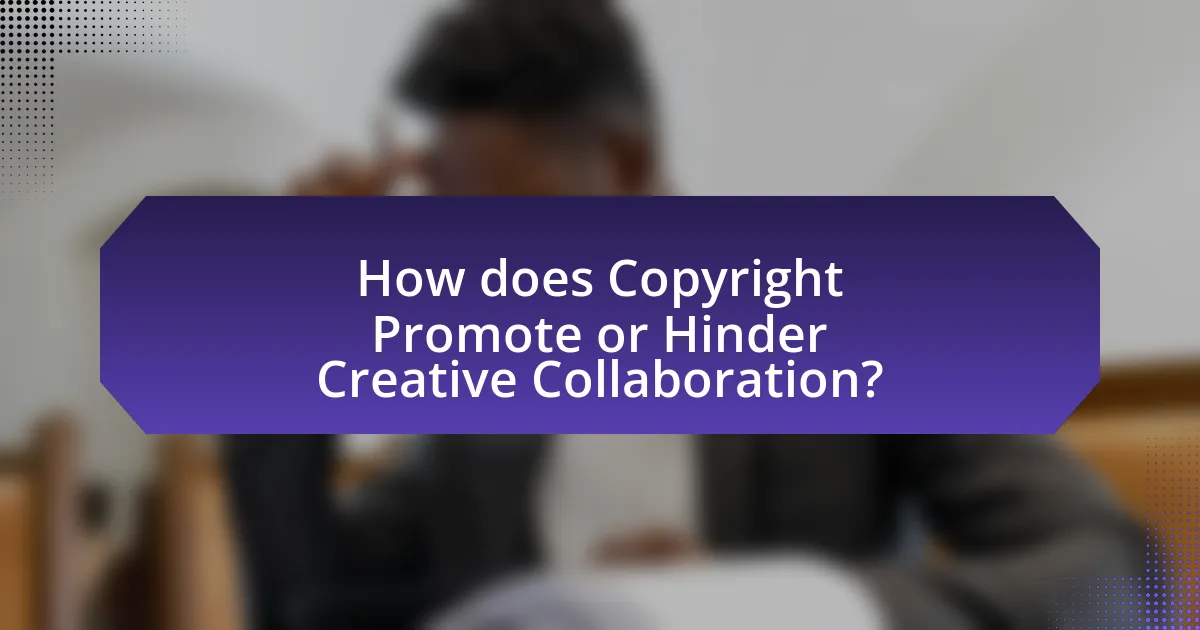
How does Copyright Promote or Hinder Creative Collaboration?
Copyright promotes creative collaboration by providing legal protection for creators, which encourages them to share their work without fear of unauthorized use. This legal framework allows artists, writers, and musicians to collaborate more freely, knowing their contributions are safeguarded. For instance, the Creative Commons licenses enable creators to specify how their works can be used, fostering an environment where collaboration is not only possible but encouraged. Conversely, copyright can hinder collaboration when overly restrictive terms prevent the sharing of ideas or when creators face legal barriers that discourage joint projects. For example, the strict enforcement of copyright can lead to a culture of caution, where individuals hesitate to build upon existing works due to potential infringement risks. Thus, while copyright can facilitate collaboration through protection, it can also create obstacles that limit the sharing of creative ideas.
In what ways can copyright protect collaborative works?
Copyright protects collaborative works by granting exclusive rights to the creators involved, ensuring that they can control the use and distribution of their contributions. This legal framework allows collaborators to share ownership of the work, which can include rights to reproduce, distribute, and display the work publicly. For instance, under the U.S. Copyright Act, joint authorship is recognized when two or more individuals create a work with the intention of combining their contributions, thus providing them with equal rights to the work. Additionally, copyright can help prevent unauthorized use or exploitation of the collaborative work by third parties, as it establishes a legal basis for enforcement against infringement. This protection encourages creative collaboration by ensuring that all contributors are recognized and compensated for their efforts.
What are the benefits of copyright for individual creators in a team?
Copyright provides individual creators in a team with legal protection for their original works, ensuring they retain ownership and control over their contributions. This protection allows creators to benefit financially from their work through licensing and royalties, which can incentivize creativity and collaboration. Additionally, copyright establishes clear rights and responsibilities among team members, reducing the risk of disputes over ownership and usage of creative content. According to the U.S. Copyright Office, copyright law encourages the production of new works by granting creators exclusive rights, thereby fostering a more innovative and collaborative environment.
How does copyright encourage innovation in collaborative settings?
Copyright encourages innovation in collaborative settings by providing legal protection for creators, which fosters a secure environment for sharing ideas and resources. This protection incentivizes individuals and organizations to collaborate, as they can confidently contribute their unique skills and knowledge without the fear of unauthorized use or exploitation of their work. For instance, research by the World Intellectual Property Organization indicates that strong copyright laws can lead to increased investment in creative industries, as stakeholders are more likely to engage in joint projects when they know their contributions are safeguarded. This legal framework not only promotes the sharing of creative outputs but also stimulates the development of new ideas, ultimately enhancing the collaborative innovation process.
What are the limitations of copyright in fostering collaboration?
Copyright imposes limitations on collaboration by restricting the use and distribution of creative works without permission from the copyright holder. These restrictions can hinder the sharing of ideas and resources, which are essential for collaborative projects. For instance, when creators must seek licenses or negotiate terms for using copyrighted material, it can slow down the collaborative process and discourage participation. Additionally, the fear of infringement lawsuits can lead to a reluctance to share work, stifling innovation and creativity. According to a study by the Berkman Klein Center for Internet & Society, overly stringent copyright laws can create barriers to entry for new creators, limiting the diversity of voices and ideas in collaborative environments.
How can strict copyright laws stifle creativity among collaborators?
Strict copyright laws can stifle creativity among collaborators by imposing limitations on the sharing and modification of creative works. These laws often create an environment of fear regarding potential legal repercussions, which discourages individuals from experimenting or building upon each other’s ideas. For instance, a study by the American Association of University Professors found that restrictive copyright policies can hinder academic collaboration, as researchers may avoid using existing works for fear of infringing on copyright. This results in a less dynamic creative process, where the potential for innovation is diminished due to the constraints imposed by stringent copyright regulations.
What alternatives exist to traditional copyright for collaborative projects?
Alternatives to traditional copyright for collaborative projects include Creative Commons licenses, open-source licenses, and public domain dedication. Creative Commons licenses allow creators to specify the permissions for use and distribution of their work, facilitating collaboration while retaining some rights. Open-source licenses, such as the GNU General Public License, enable collaborative software development by allowing users to modify and share code freely. Public domain dedication, through tools like the Creative Commons Public Domain Dedication (CC0), allows creators to relinquish all rights, enabling unrestricted use and collaboration. These alternatives promote sharing and collaboration while addressing the limitations of traditional copyright.
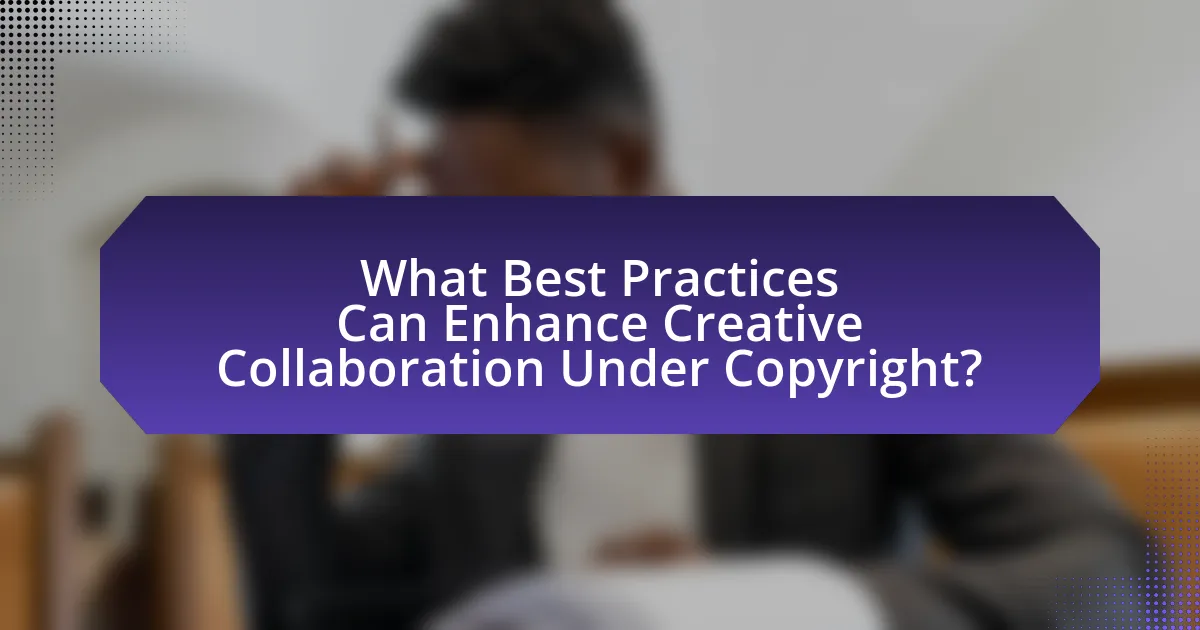
What Best Practices Can Enhance Creative Collaboration Under Copyright?
Best practices that can enhance creative collaboration under copyright include establishing clear agreements, utilizing copyright licenses, and fostering open communication. Clear agreements define the roles, responsibilities, and ownership of contributions, which minimizes disputes and clarifies expectations among collaborators. Utilizing copyright licenses, such as Creative Commons, allows creators to specify how their work can be used, shared, and modified, promoting a collaborative environment while protecting individual rights. Open communication encourages transparency and trust, enabling collaborators to share ideas freely and address concerns promptly. These practices are supported by research indicating that structured collaboration frameworks lead to more productive and innovative outcomes in creative projects.
How can collaborators navigate copyright effectively?
Collaborators can navigate copyright effectively by establishing clear agreements that outline ownership, usage rights, and responsibilities regarding creative works. These agreements should specify how contributions will be credited, how profits will be shared, and the duration of copyright protection. According to the U.S. Copyright Office, works created collaboratively are typically owned jointly unless otherwise agreed, which emphasizes the importance of written contracts to avoid disputes. Additionally, collaborators should familiarize themselves with copyright laws relevant to their jurisdiction to ensure compliance and protect their rights.
What agreements should be in place to protect all parties involved?
To protect all parties involved in creative collaboration, a comprehensive copyright agreement should be established. This agreement must clearly define ownership rights, usage rights, and revenue sharing arrangements among collaborators. For instance, specifying who holds the copyright to the created work and how it can be used commercially is essential to prevent disputes. Additionally, a non-disclosure agreement (NDA) should be in place to safeguard confidential information shared during the collaboration process. These agreements are crucial as they provide legal clarity and protection, reducing the risk of misunderstandings and potential legal conflicts, which can arise in collaborative creative projects.
How can clear communication mitigate copyright-related issues?
Clear communication can mitigate copyright-related issues by ensuring that all parties involved in a creative collaboration understand their rights and responsibilities regarding intellectual property. When creators explicitly discuss ownership, usage rights, and licensing terms, they reduce the likelihood of misunderstandings that can lead to copyright infringement. For instance, a study by the World Intellectual Property Organization highlights that clear agreements and open dialogue about copyright can prevent disputes and foster a more collaborative environment. By establishing transparent communication channels, creators can clarify expectations and avoid potential legal complications associated with copyright violations.
What resources are available for understanding copyright in collaboration?
Resources available for understanding copyright in collaboration include the U.S. Copyright Office website, which provides comprehensive guidelines and legal information regarding copyright laws. Additionally, the Creative Commons organization offers licenses that facilitate collaborative projects while clarifying copyright terms. Academic journals such as the “Journal of Intellectual Property Law & Practice” publish research articles that explore the implications of copyright in collaborative environments. Furthermore, books like “Copyright Law for Dummies” by Henri Charmasson and “The Copyright Handbook” by Stephen Fishman serve as accessible guides for individuals seeking to navigate copyright issues in collaborative settings. These resources collectively enhance understanding of copyright’s role in creative collaboration.
Where can creators find legal advice regarding copyright in collaborative works?
Creators can find legal advice regarding copyright in collaborative works through specialized intellectual property attorneys, legal aid organizations, and online legal resources such as the U.S. Copyright Office website. Intellectual property attorneys provide tailored legal guidance based on specific collaborative projects, while legal aid organizations may offer free or low-cost consultations. The U.S. Copyright Office website contains comprehensive information on copyright laws, registration processes, and FAQs that can assist creators in understanding their rights and obligations in collaborative settings.
What tools can assist in managing copyright for collaborative projects?
Tools that can assist in managing copyright for collaborative projects include copyright management software, digital rights management (DRM) systems, and collaborative platforms with built-in copyright features. Copyright management software, such as EasyCopyright and Copyright Clearance Center, helps track and manage copyright ownership and licensing agreements. Digital rights management systems, like Adobe Content Server, protect digital content and enforce copyright restrictions. Collaborative platforms, such as Google Workspace and Microsoft Teams, often include features for document version control and attribution, which are essential for maintaining copyright integrity among multiple contributors. These tools facilitate clear communication regarding copyright ownership and usage rights, thereby enhancing the collaborative process while ensuring compliance with copyright laws.
